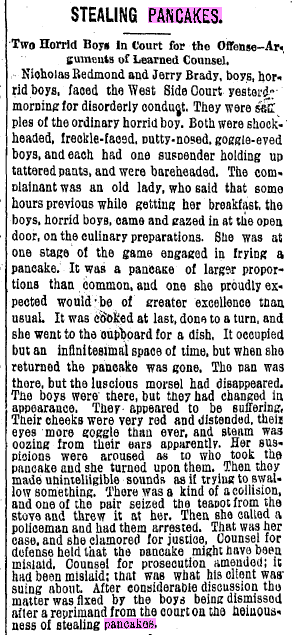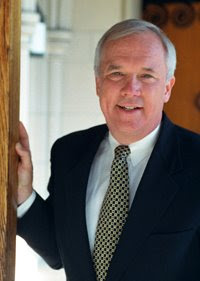The Tennessee State Library and Archives keeps an online collection of 19th century newspapers. I believe the writers and readers of these newspapers were completely insane. Perhaps it was because they sprinkled lead on their eggs each morning, or their tendency to put opium in their puddings and Methodist sermons. To demonstrate this insanity, I offer you pancake stories from 19th century newspapers:
This one was in two different newspapers 10 years apart. It was just that good a joke, I suppose:
“John,” said a stingy old hunks to his hired man,”do you know how many pancakes you’ve eaten?”
“No, I don’t.”
“Well, you’ve eaten fourteen.”
“Yes? Well, you count and I’ll eat.”
I don’t even know if I can believe this one, but it was right next to scarlet fever news and other items:
One directly Pancake Tuesday related:
Shrove Tuesday and its Pancakes.
To-day is generally known as Shrove Tuesday, though the fact that it is so-called because in olden times people shrove themselves, that is confessed their sins to priests, is as generally ignored. The light-heared French have given it another name, Mardi Gras, signifying “flesh-meat Tuesday,” the day when the “farewell to flesh” is pronounced. The masquerading and other amusements indulged in are by the antiquarians traced back to the Bacchanalia of the Greeks and the Saturnalia of the Romans, and Christian clergy have violently denounced them. In “merry England” the day was celebrated by the burning of effigies, cock-fights, throwing at cocks, games of football, and the “barring-out” of the schoolmaster. One of the customs then in vogues has been preserved to this day, principally among the Irish, and consists in the cooking and eating of large quantities of pancakes. In one of these is placed a ring, and the lucky finder is assured that he or she will be married within the coming year.
Aunt Jemima pancake flour has been around since at least 1892, and according to an ad “A Chicago policeman became polite from eating pancakes made from Aunt Jemima’s Pancake Flour.”
Pancakes also killed people on at least two occasions, both due to arsenic accidentally being put in the pancakes.
Mmmm pancakes.




